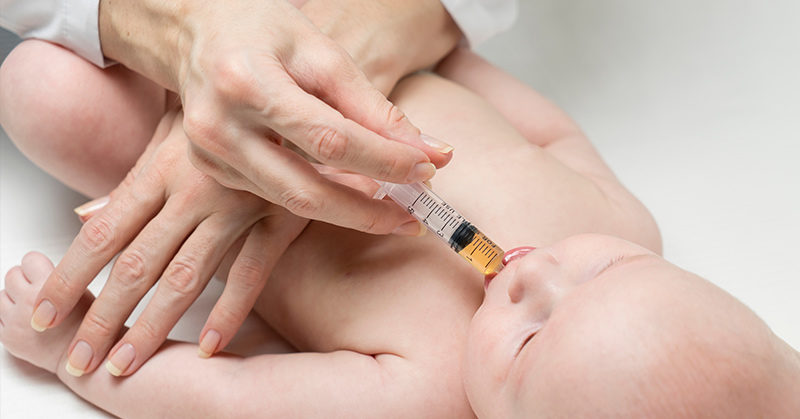The development of antibiotics changed the world of medicine. They allowed doctors to treat infectious diseases like smallpox, cholera, diphtheria, pneumonia, and others, effectively saving millions of lives [1]. Today, however, antibiotic resistance is on the rise, and new research has found that antibiotic use in babies is linked to allergies, asthma, and other health conditions.
Antibiotic Use in Babies
A new study has found that when we give antibiotics to children under the age of two, they are more likely to develop a number of ongoing health issues later in life. These conditions include asthma, eczema, hay fever, food allergies, celiac disease, problems with weight and obesity, and attention deficit hyperactivity disorder.
What’s more, a child who receives multiple antibiotic treatments when they’re less than two years old is more likely to have multiple conditions.
The data came from over 14 500 children, who are part of the Rochester Epidemiology Project. This project is a long-term study of volunteers in Minnesota and Wisconsin. Approximately seventy percent of the children in the study had received at least one antibiotic in their lifetime. Some had received multiple.
The researchers emphasized, however, that this study does not show that antibiotic use in babies causes these conditions. It simply shows that there appears to be an association between the two.
“These findings offer the opportunity to target future research to determine more reliable and safer approaches to timing, dosing and types of antibiotics for children in this age group,” said senior study author Nathan LeBrasseur [2].
The Specifics
According to the research, these illnesses differed based on the child’s gender, age, type of medication, dose, and number of doses. For example, among the children who received one or two prescriptions, only girls had a significantly increased risk for asthma and celiac disease. This changed, however, with a higher number of prescriptions.
“By contrast,” LeBrasseur and his team wrote, “receiving three to four prescriptions was associated with a higher incidence of asthma, atopic dermatitis, and overweight in both sexes, ADHD and celiac disease in girls, and obesity in boys.” [2]
Antibiotic use in babies of both sexes when they were given five or more prescriptions, however, was associated with a significantly higher risk for developing asthma, allergic rhinitis, overweight, obesity, and ADHD. The girls were at a higher risk of celiac disease.
Two common antibiotics that came up were penicillin and cephalosporin. The research linked penicillin with a higher risk for asthma and overweight in both sexes, celiac disease and ADHD in girls, and obesity in boys.
The researchers linked cephalosporin with the greatest number of conditions, in particular food allergies and autism.
What is the Connection Between Antibiotics and These Health Conditions?
So what is the link between antibiotic use in babies and all of these health conditions? The truth is, the researchers don’t know yet. They do, however, have some hypotheses.
One of these theories is that it could be because antibiotics disrupt the bacteria in the baby’s gut. This could compromise the baby’s immune system, neural development, body composition, and metabolism.
The researchers explain that antibiotics don’t discriminate between “good” and “bad” bacteria. Instead, they kill them both, which leaves the baby’s gut without appropriate microbiome distribution. When this happens, the baby can’t absorb nutrients or break down foods. They also don’t have the right bacteria to protect their entire digestive system from pathogens.
“When antibiotics were first developed and deployed, the overwhelming consideration was control of pathogens. We now realize that their widespread application has considerable collateral effect on the microbiome, which may be of special importance in developing children,” the study said [2].
Antibiotic Use in Babies Should be Minimal
As the researchers said, it is still unclear as to whether or not antibiotics actually cause these health issues. For this reason, future research is necessary to confirm these findings.
That being said, this study shows that limiting antibiotic use in babies may be important for preserving their future health. Of course, there will always be instances in which antibiotics are necessary. Health care practitioners, however, should always consider alternative treatments if they are available.
Keep Reading: ‘Rapid evolution’ means humans now being born without wisdom teeth

